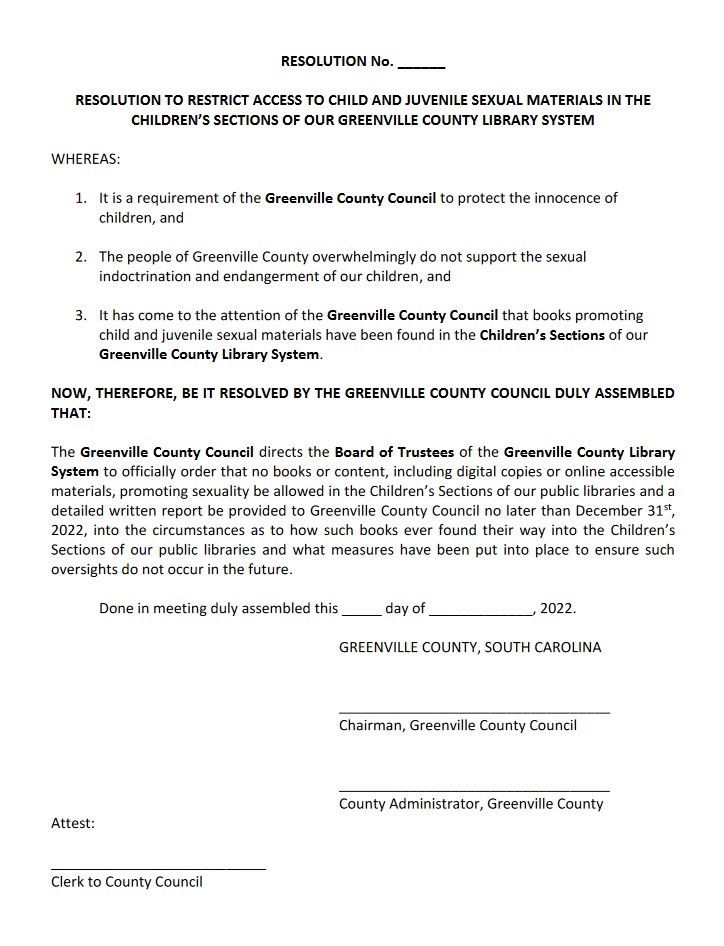
It was a standing room only crowd this past Tuesday night at Greenville County Council as councilors discussed a resolution brought by District 17 councilman Joe Dill regarding sexually explicit books in the Greenville County Library System.
Dill's resolution reads, in part, “The Greenville County Council directs the Board of Trustees of the Greenville County Library System to officially order that no books or content, including digital copies or online accessible materials, promoting sexuality be allowed in the Children's Sections of our public libraries. . .”
The resolution further calls for the the library system to report back to council the details as to how the materials ended up in the children's sections in the first place and what is being done to prevent such occurrences from happening again.
The resolution does not call for banning the books from the libraries, only removing them from the children's sections, where they can be easily seen by young children, and removing them to the adult sections, where parents would be free to check them out for their children if they so wished.
Each meeting of the council, which occurs every first and third Tuesday of the month, allows up to 30 minutes for comments from the audience. Several citizens from both sides of the issue showed up at council more than an hour before the 6:00 p. m. start time in order to get in line so that they could sign up to speak. Some people who had signed up to address the council did not get to do so after the 30 minutes had been used up.
The first speaker, a woman who favors keeping those books in the children's section, identified herself as a Christian pastor. She suggested that maybe the Bible does not belong in the library because of passages describing improper sexual activity, such as the men of Sodom and the story of David and Bathsheba.
Later, a woman in favor of the resolution countered that argument by warning that David's sin with Bathsheba began when he cast his eyes upon her and then lusted after her.
Another woman told of how she had almost been a victim of the sexual serial killer Ted Bundy, who became addicted to pornography and later violence toward women when he first laid eyes upon discarded pornographic magazines when he was only eight yeasrs old.
Supporters of these books being allowed to remain in the children's section appeared to outnumber the supporters of traditional family values, at least telling by the loudness of the applause.
Another speaker accused supporters of the resolution of wanting to exercise power over other parents in dictating what books the children have access to and to punish the LGBTQ community. It might be argued that this assertion is erroneous because parents have every right to buy any books that they think are appropriate for their children. The library is a taxpayer-funded institution, thus giving all taxpayers a say in how it is run.
This speaker said that, although supporters of the resolution claim to want to help children, “Instead, they seek to do real harm to children and teens.” The speaker also erroneously claimed that supporters of the resolution sought to ban the books, when in reality they merely wanted them to be removed to the adult section, where any parent can check them out for their child if they saw fit.
The speaker referenced a book titled 'Love, Violet,' about a shy young girl who has a crush on another young girl. She said that keeping the book in the children's section is not harming anyone but that removing it to the adult section will cause harm.
Kirkus Reviews, a book-reviewing service, called the book, “a perfect celebration of courage and queerness.” Amy Fellows, writing in the School Library Journal, praised the book as well.
Another speaker was Sid Cates, a former member of council who is now on the library board. He told the council that his committee has recently formulated a recommendation on the issue and will present that recommendation to the full library board at its December meeting. Cates did not reveal any specifics as to what the committee will be recommending.
After any resolution is introduced to council, it is referred to the appropriate committee at first reading. If that particular committee, which meets at a later date, decides to recommend approval of that resolution, it is then sent back to council for second reading. If it passes at second reading and then passes at third reading two weeks later, it becomes an ordinance. Such a process could take at least four weeks, if not longer.
Dill requested that the council suspend the rules so that the resolution could be discussed and dealt with that night. Although some councilors stated that they agreed with the sentiment of the resolution, they did not agree with suspending the rules.
The vote for suspending the rules was 9 to 3. Those councilors voting in favor of suspending the rules so that the resolution could be discussed were Joe Dill, Steve Shaw and Stan Tzouvelekas. Those voting not to suspend the rules were Michael Barnes, Dan Tripp, Willis Meadows, Chris Harrison, Liz Seman, Xanthene Norris, Ennis Fant, Lynn Ballard and Butch Kirven.
In referencing Cates, councilor Butch Kirven said that the board should be allowed to do its job.
Meadows said that, although he believed that the books did not belong in the children's section, he also believed that the council did not have the authority to tell the board what to do.
“It is not the prerogative of this body to tell another body that this is what you're supposed to do, said Meadows. “I don't think that's our job. We can tell them what our thoughts are and we can make recommendations.”
Section 4-9-36 of the South Carolina Code of Laws, which deals with the duties of library boards of trustees, states, in part, “The board as provided for in Section 4-9-35 shall be authorized to exercise powers as to the policies of the county library which shall not be inconsistent with the general policies established by the governing body of the county (i. e., County Council) . . .”
It could be argued from this clause that council does, indeed, have the authority to set a policy that the library board would have to adhere to.
Dill responded to Meadows, “I think this resolution supports the library board in the direction from what I understand that they're going. . . I think that the resolution needs to have its day on the floor.”
After Tripp questioned Dill's timing in introducing the resolution, he then asked Dill, “One final respectful question . . . Did you go up to a group in Travelers Rest and tell them that you're going to go out in a blaze of glory and that you're introducing this resolution?”
Dill said that he had not said any such remark. Tripp then said, “That's not what I heard.” Tripp did not reveal the name of the person from whom he supposedly heard this.
Tripp said that he has young children and that he doesn't want them to see pornographic material at the library, but that, ultimately, parents have to take responsibility. “I'm not denigrating necessarily what you're doing,” he said to Dill, “I'm questioning the timing and the rationale for doing this and all it's doing is dividing the community.” He added, “Let the library do their job. If they don't do their job we can come back and have another bite at the apple.”
Fant said that he does not want these materials in the children's section but that library employees and board members recently told him “that the library already has a policy in place against sexually explicit materials in the children's section.” He said that it would set a bad precedent to “micromanage” every board and commission.
Ballard, too, said that he does not want to micromanage boards and commissions. He also said that he had visited two libraries to look for objectionable materials. “There was no book of any concern in the children's area,” he said. Dill, however, said that he visited a library and that he did find such material.
Tsouvelekas said, “I think it's wrong to have those kind of books in the children's section.” One audience member called out, “They're not.”
“If you don't stand for what's right you'll fall for what's wrong,” Dill said. “I believe there's an agenda somewhere, and from what we heard some of the speakers say here tonight, it sounds like it might be a national agenda and maybe we want to just go ahead and let our children be sucked right into this national agenda that's doing away with our children's being a child.” He added, “If you don't agree with the wording in this resolution, all you got to do is amend it, but we need to do something to support our library board.”
















